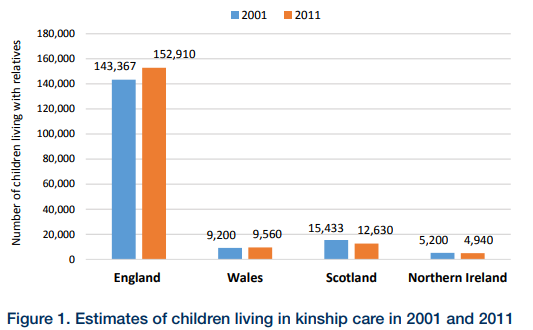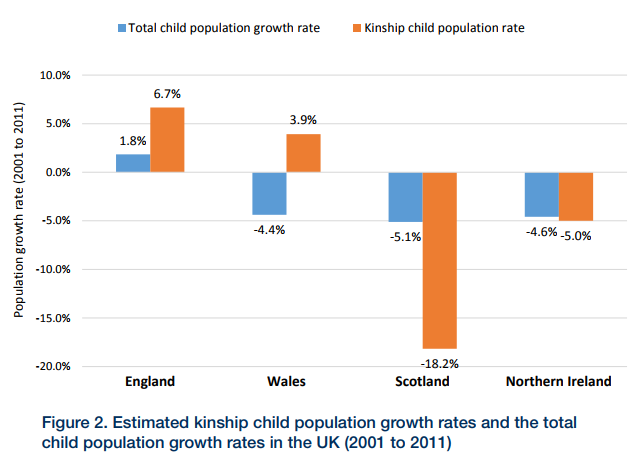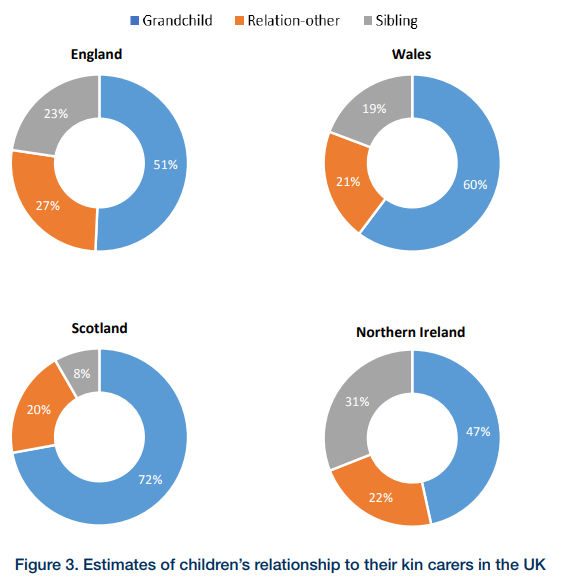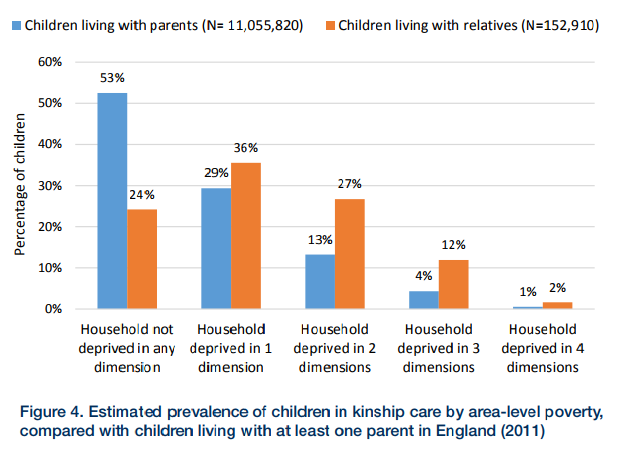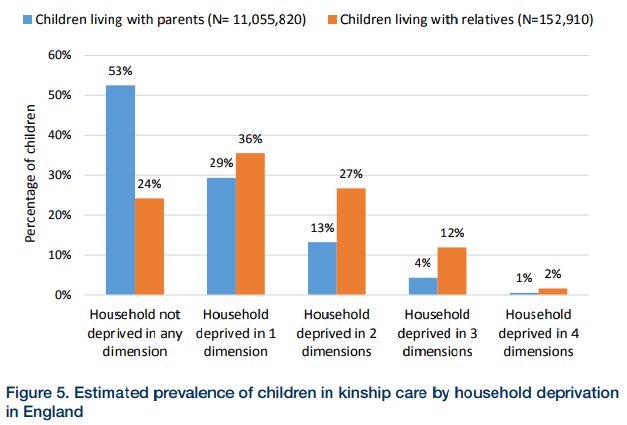Children growing up in the care of relatives in the UK
The family environment that children grow up in can greatly influence their outcomes in terms of development and wellbeing. Although most children in the UK still live with at least one parent, some are unable to live with their parents due to reasons such as neglect or abuse by parents, parental sickness or death, parents being in prison, family circumstances such as poverty, parental drug and alcohol abuse or mental health issues. The majority of these children live with relatives or friends, otherwise known as kinship care.
About the research
Kinship placements can be either arranged formally through local authorities and courts, or informally between relatives and friends. In the absence of good parental care, kinship care is generally considered a better alternative to being fostered by unrelated foster carers, as children are more likely to have better mental health and behavioural outcomes.
There is no legal obligation placed on the families to inform authorities of kinship care arrangements. Therefore, most children and families are not known to the authorities and thus do not receive specific support from the State. Nor is there a statutory provision available to address the impact of early adverse experiences on the health and wellbeing of these children.
This briefing paper provides the most current estimates of the number and characteristics of the children growing up with relatives in the UK, which were established through analyses of secure microdata from the 2011 Census.
The number and characteristics of the children growing up with relatives
- Based on the Census data, in 2011, there were around 180,000 children growing up in the care of relatives2 in the UK.
- In all four countries of the UK, there were slightly more male children growing up with relatives (51%, England, 54% Wales, 52% Scotland, 51% Northern Ireland).
- Older children (13+ years) account for a much larger share of the kinship child population than they do for child population as a whole.
- Compared with children living with at least one parent, children in kinship care were twice as likely to report disabilities and long-term health problems.
The population of the children growing up in in the care of relatives in England and Wales are growing at a rate higher than the growth of the child populations
Since 2001, the numbers of children growing up in the care of relatives in England and Wales had grown at rates higher than the child population of the countries.
Scotland, on the other hand, has seen a sharp decrease in the number of children growing up in the care of relatives. In Northern Ireland, both the total child population and the kinship child population had decreased since 2001 at a similar rate.
The characteristics of the carers of the children
There are three distinct types of relatives caring for the children: grandparents, siblings or other relatives (such as aunts, uncles and cousins).
In all countries of the UK, the majority of relative-carers are grandparents.
Sibling carers are more likely than grandparent and ‘other’ relatives to be looking after two or more children in the household.
When compared with parents, relative carers are more likely to:
- Report more health problems
- Have more caring responsibilities
- Have lower income
- Be in social grades D and E (semi-skilled & unskilled manual occupations, unemployed and lowest grade occupations)
- Be living in social rented accommodation
Children in kinship care face more poverty than children living with at least one parent3
Poverty has an impact on the overall health and wellbeing of families and negatively impacts children’s life trajectories.
Compared to children living with at least one parent, more children in kinship care are likely to be living in the poorest areas of England. Two in every three children in kinship care were living in households located in 40% of the poorest areas in England.
Children in kinship care face more deprivation than children living with at least one parent4, 5
- The 2011 data were further explored to see whether children living in kinship care were experiencing any household deprivation.
- In England 41% of children in kinship care were living in households deprived in at least two of the four indicators considered (Employment, Education, Housing, Health and disability). In comparison, this was true for 18% of children living with at least one parent.
Policy implications
- A statutory requirement should be introduced requiring the registration of all informal kinship care arrangements.
- The government should place a statutory duty of care on local authorities not only to assess, but to provide support for kinship families.
- Kinship families should be recognised as an established family type and carers should be entitled to the same benefits as parents (such as child benefit) within the State benefits systems.
- Children in kinship care should be given access to the same health, education and care prioritisation as children in care.
- Government strategies to address poverty and deprivation should specifically address kinship families, who are likely to need additional help and services.
- There is a need for greater awareness of children in kinship care and their carers within the health, education and social care systems in the four UK countries, in order to enable more targeted, timely and appropriate support.
Further information
To find out more about this research, including information about the methodology and detailed briefings for each country, please visit the project website: www.bristolkinshipstudy.co.uk
A more detailed policy briefing on kinship from the Kinship Care Alliance in England can be accessed here.
Notes
All statistical 2011 estimates from: ONS. Estimates calculated from 2011 Census Secure Microdata with 2001 comparison data extracted from Nandy et al., 20111. Usually, kinship care is defined as when a child is brought up by a relative or a friend. However, it was not possible to identify children growing up in the care of friends in the Census. Therefore, children in kinship care in this study are children who are growing up in the care of relatives, such as grandparents, siblings, aunts, uncles and cousins2.
This work contains statistical data from the Office for National Statistics (ONS), which is Crown Copyright. The use of ONS statistical data in this work does not imply the endorsement of the ONS in relation to the interpretation or analysis of the statistical data. This work uses research datasets which may not exactly reproduce ONS aggregates.
References
1. Nandy, S., Selwyn, J., Farmer, E., & Vaisey, P. (2011). Spotlight on Kinship Care: Using Census microdata to examine the extent and nature of kinship care in the UK at the turn of the Twentieth century. Bristol: University of Bristol.
2. Given the exclusion of the number of children growing up in the care of friends, the estimates of kinship care are likely to be an underestimation of the total number of children who are growing in the care of relatives and friends.
3. This analysis could be conducted only for England and Wales due to the lack of available data within the Scottish and Northern Ireland Census microdata.
4. This analysis could be conducted only for England and Wales due to the lack of available data within the Scottish and Northern Ireland Census microdata.
5. According the 2011 Census, a household was classified as deprived if it met one or more of the following conditions: Employment: where any member of a household, who is not a full-time student, is either unemployed or long-term sick, Education: no person in the household has at least level 2 education (see highest level of qualification), and no person aged 16-18 years is a full-time student, Health and disability: any person in the household has general health that is “bad” or “very bad” or has a long-term health problem, Housing: the household’s accommodation is either overcrowded, with an occupancy rating -1 or less, or is in a shared dwelling, or has no central heating. A household was classified as being deprived in none, or one to four of these dimensions in any combination.
Dinithi Wijedasa, Hadley Centre for Adoption and Foster Care Studies, University of Bristol

